Witty Little Knitter
Sometimes I write for Bibliodaze
Currently reading


Review: Eastern Europe

Eastern Europe is big. (Especially since the author points out that defining what exactly Eastern Europe is, is rather complicated and that he decided to use the term in the widest possible sense), The book covers the time from roughly 500 AD to the fall of the Soviet Union. This is also a lot of time. The book has 500 pages, which might seem a lot at first but often only leaves 2 or 3 pages (sometimes not even that) to describe what happened in a certain region in a certain time. There is just an awful lot of facts crammed into very little space. As a result, not a lot of the things I read about really stayed with me. If I already knew a bit about a certain topic the short chapters often helped me to remember it better (and perhaps learn and remember a bit more) but if something was completely new to me it usually got lost between everything. I think it would have helped if the book had focussed on a shorter time-frame and then spent a bit more time on the single chapters.
Well and then there're the Useless Trivia sections. Throughout the book, there are short asides titled - duh - Useless Trivia - and a snappy, amusing heading like 'Reach out and touch someone...else...' or 'Things to name a Heavy Metal Band after'.
According to the author, these are 'utterly useless historical, cultural, or other completely senseless facts about Eastern Europe'. He also says 'these little factoids can be fun'. He doesn't directly say that one can simply skip these bits but it's clear that the important bits are outside the 'Useless Trivia' sections.
Now a lot of these bits are exactly that. For example, you learn why St. Nicholas day is celebrated on December 6th (because the historical Nicholas destroyed lots of temples dedicated to Diana whose sacred day was December 6th). Other bits are just very useless and not even in an amusing way. Like the Cold War has several UT-bits titled 'Which side are you on?' with short biographies of people who first supported the regime very strongly but later criticized it openly. I think that might have been more useful to talk about that topic in more general terms instead of picking out single cases. Other bits are just about famous people from the US with Eastern European roots which is possibly a YMMV-thing (and well the book is aimed at a US-audience) but I often really didn't see the point of including these things.
Well, and then there are parts where I think Useless? Fun? WHAT?
Among the events that got the 'summed up under a snappy and amusing headline' treatment are:
- the siege of Leningrad
- the assassination of Heydrich and the subsequent Nazi massacres of the Czech
- stories of people who were shot while trying to cross the Berlin Wall
Now I do have some problems with calling these 'fun little factoids'. OK, I have a lot of problems with that. (Also, the exact circumstances of the fall of the Berlin Wall are also in a 'Useless Trivia' section because...because?)
There are also a lot of graphics in this book. One of them is a language family tree in such an abysmal quality that it's completely unreadable. It looks like a thumbnail that has been blown up to the size of a page...now it's only one but finding this in a published book is annoying. There are also a lot of maps, which are are great (and so helpful for geography-illiterates like me) and timelines, which are less great. Every chapter has two timelines at the beginning: one with the events happening in Eastern Europe and the other with world events. I would have gotten more out of this if that had simply been done with a table with two columns because then I could have seen much easier which two things had happened at roughly the same time.
Overall the author has a style that is easy to read and I'll definitely keep this book and will also look into it again (and in the 20-page long bibliography to find other books) but it could be a lot better than it is.
Review: Dust and Shadow
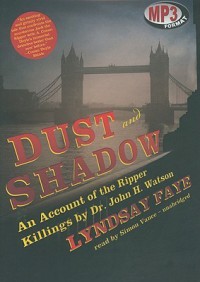
I have a complicated relationship with Jack the Ripper fiction. I really want to like it but I rarely do. In fact, the only one I really enjoyed was Melanie Clegg's From Whitechapel and you could argue that it is more a novel that uses the case as background than an actual Ripper-novel.
My track-record with Holmes meets the Ripper fiction is even worse. In the best case, I found them totally forgettable but mostly they were so horrid that I wanted to rip them into little pieces.
Dust and Shadow is different. I love it. It's a great Holmes-pastiche. Faye catches the voice of Watson perfectly. I also didn't feel that her Watson was too stupid or her Holmes too cold, both are things that often ruin Holmes pastiches for me.
It's also a great fictional account of the Ripper killings. With the focus on fictional. I don't mean that Faye didn't do her research (she definitely did), but in reality, there was no Sherlock Holmes involved in the investigation. The fact that here he was does change some minor things because the Ripper reacts to Holmes' involvement. I think only absolute purists can object to the way this was handled. I found it very well done (and I have often grumbled over stuff like this ^^).
The whole subject is also treated with the respect it deserves. Of course, this is the true story of the brutal killings of several women and you can certainly argue that it is always ghoulish to read/watch/listen/play anything inspired by something like that. I know that there are people who wouldn't do that under any circumstances and I am aware that my enjoyment of these stories might be a bit questionable...
But there are different ways to treat this case (I actually read a story once in which the author thanked Jack the Ripper in the foreword because he inspired so many authors...really). This book never forgets that the victims were people and the characters act accordingly.
Then there is of course the question of the ending. It won't be a spoiler when I tell you that this book doesn't stray so far from the historical facts that the Ripper is caught and everybody is happy. I've seen various ways the question 'Why didn't they say anything when they knew who it was' (if in fact they found out...) was handled and I have to say that I liked this one best so far. It made sense and was not out of character for Holmes.
Review: The Shadow Soul
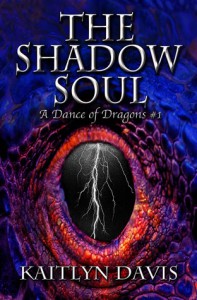
Review of Book 0.5 in the series is here
The worldbuilding in this was just very confusing. Jinji and her people are clearly inspired by Native Americans. Including that one day the white men – Rhen’s ancestors – came, took their land and suppressed them. But…they suppressed them…only sometimes a bit…or something. The only thing Jinji talks about is that they are not allowed to speak their language anymore. To make sure of that a guy visits them once a year and checks on them…And Jinji still speaks the language (though it is not clear if she is fluent or if she just knows some words that can’t be translated in the language of the ‘Newworlders’).
I just got the impression that the author had realized how problematic Pocahontas is but enjoyed it nevertheless and wanted to rewrite it with less evil oppressors but still wanted to keep the oppression at least a bit. Just like in the prequel novella I read, it seems that there didn’t go that much thought in the worldbuilding.
I also couldn’t make out how many ‘Oldworlders’ there roughly are. We don’t get any number for Jinji’s tribe but I had the impression they were roughly 100, rather less than that. Are there any other natives in this world? Perhaps but probably not. At least, I think so. Jinji repeatedly says that she is the only one left after her tribe was slaughtered in the beginning of the book. She could mean that she is the last of her tribe (the Arapapajo) but other tribes are never mentioned. Were there ever others? Were there ever more Arapapajo? Who knows?

And neither does the author apparently.
Sometimes the book does things well. For example, when Jinji thinks about how she will continue disguising herself as a boy as long as she is in the city because being a Native among white people sucks but being a Native girl would suck even more. But at the same time the bad guys in the books are a) Ye Olde Fantasy equivalent of Arabs and b) as cliché-evil as you can get.
Seriously, I was surprised that their king wasn’t introduced stroking a black cat. He’s evil because he’s evil and enjoys laughing diabolically.
The rest of the book is also not more than average. The plot just…happens. I rarely had time to worry too much about the characters because they are never in danger for very long. Chapters frequently ended in cliff-hangers, which were then resolved in the course of the next chapter. Often with the help of plot-convenient magic but nobody really wanted to talk about that magic because reasons.
So, yes I liked this more than the prequel novella but it still wasn’t that good.
Review: Germania

In der zerbombten Reichshauptstadt macht ein Serienmörder Jagd auf Frauen und legt die verstümmelten Leichen vor Kriegerdenkmälern ab. Alle Opfer hatten eine Verbindung zur NSDAP. Doch laut einem Bekennerschreiben ist der Täter kein Regimegegner, sondern ein linientreuer Nazi. Der jüdische Kommissar Richard Oppenheimer, einst erfolgreichster Ermittler der Kripo Berlin, wird von der Gestapo reaktiviert. Für Oppenheimer geht es nicht nur um das Überleben anderer, sondern nicht zuletzt um sein eigenes. Womöglich erst recht dann, wenn er den Fall lösen sollte. Fieberhaft sucht er einen Ausweg aus diesem gefährlichen Spiel.
NB: Diese Rezension bezieht sich auf das gekürzte Hörbuch
1) Das Buch an sich:
Es gibt eine Stelle an der Oppenheimer von einer Freundin gefragt wird ob er den letzten Montag gut überstanden hat. Zuerst weiß er gar nicht wovon sie spricht, dann fällt ihm ein, dass es an dem Tag ja einen Bombenangriffs in der Nähe seiner Wohnung gegeben hat.
So eine Szene zeigt ja sehr viel. Aus heutiger Sicht ist es schwer vorzustellen, dass man so etwas einfach vergisst und dass Oppenheimer es doch tut zeigt so einiges über die damaligen Zustände/Oppenheimers Zustand.
Eigentlich ist so eine Szene prima. Eigentlich. Leider traut der Autor seinen Lesern wohl nur einen IQ knapp über Zimmertemperatur zu, denn am Ende der Szene sinniert Oppenheimer dann noch schnell darüber, dass es wirklich seltsam ist, dass er so etwas einschneidendes wie einen Bombenangriff nur wenige Tage später wieder vergessen hat und wie das andere, die das nicht selbst erleben, kaum verstehen können.
Das ist nicht die einzige Szene in der der Autor erst beweist, dass er Gefühle u.ä. eigentlich ganz gut zeigen kann aber gleich noch eine Erklärung von dem was er gerade gezeigt hat nachschiebt. Das ist noch frustrierender als ein Autor, der nur erklärt, denn er kanns ja. Eigentlich.
Dazu kommen noch eine unglaubliche Menge an Infodumps. Und zwar die der schlimmsten Sorte, die wirken als wären sie direkt aus einem Geschichtsbuch kopiert. Über die Reichspogromnacht, die Presse im 3. Reich, welche Autoren verboten waren, die genaue Funktionsweiße und Aufgabenbereiche von SS, Gestapo und SD… Zum einen kann man sich fragen ob man nicht zumindest bei einigen dieser Dinge erwarten kann, dass der Leser zumindest die Grundlagen davon schon weiß. Zum anderen, selbst wenn jemand dieses Buch liest für den all das neu ist: über die Hälfte der Dinge sind für die Handlung sowieso nicht relevant sind. Um dem Plot folgen zu können muss ich nicht wissen, dass Tucholsky und Kästner verboten waren.
Das einzige was nicht mit einer halbseitigen Erklärung versehen ist, ist die ständige Pervitin-Einnahme der Charaktere. Aus dem Kontext konnte man zwar herauslesen, dass es sich um irgendeine Art von Stimmungsaufheller handeln muss aber es blieb so vage, dass ichs am Ende doch selber gegoogelt habe. (Mit anderen Worten: Der Autor meint seinen Lesern sagen zu müssen, dass Bücher von Karl Marx in der NS-Zeit verbrannt wurden, aber erwartet, dass sie etwas über ein Arzneimittel wissen, das seit 1988 nicht mehr vertrieben wird).
2) Der Krimi
War…OK. Am Ende vielleicht ein bisschen zu viele glückliche Zufälle aber für mich hielt sich das noch im erträglichen Rahmen. Und schließlich ist Germania kein typischer Krimi, der in einem (mehr oder weniger) demokratischen Land spielt, mit einem Ermittler der klare Befugnisse hat sondern ein Krimi mit einem jüdischen Ermittler in Berlin 1944. Wenn man da trotzdem noch einen typischen Krimi mit Ermitteln, Hinweisen und einem Täter der klar identifiziert (und bestraft) will, dürfte es schwierig sein das ohne den einen oder sehr glücklichen Zufall zu schaffen.
3) Hm…ja
Und dann ist da natürlich noch die ganze Prämisse. Die mich auch erst sehr skeptisch gemacht hat, weil ich befürchtet habe der Autor würde ‚jüdischer Ermittler in Nazi-Deutschland‘ nur als eine Art Gimmick verwenden. Frei nach dem Motto ‚da können die ganzen Skandinavischen Kommissare noch so traurig schauen, so tragisch wird ihr Leben nie‘ aber die Befürchtung war unbegründet. Trotzdem hätte man es sicher auch besser machen können. Wie die Krimihandlung und das Buch an sich ist es einfach mittelmäßig. Vielleicht ein bisschen besser, da z.B. Begegnungen zwischen Oppenheimer und alten Bekannten, die ihm sagen, dass sie ja nichts gegen ihn persönlich haben aber die Juden an sich… tatsächlich so stehen gelassen werden und ohne anschließend Erklärung was er von solchen Kommentaren hält auskommt.
Aber das geht dann stellenweise wieder zu sehr in die andere Richtung. Nach knapp der Hälfte des Buches fängt Oppenheimer nämlich an ein doppeltes Spiel zu spielen und Informationen an jemanden weiterzugeben, von dem er hofft, dass er ihn aus Deutschland rausschmuggeln kann und…das tut er einfach. Ohne das irgendwie darauf eingegangen wird, was passiert wenn das rauskommt. Zwar erwarte ich nicht, dass er ständig darüber nachdenkt aber dass er es gar nicht tut, ist auch schwer zu glauben.
Alles in allem: durchschnittlicher Durchschnitt aus dem man hätte mehr machen können. Band zwei höre ich vielleicht irgendwann mal, aber eigentlich hab ich genug andere Hörbücher.
Free e-book on Queer Sci-Fi
We’re doing something new in 2016 – sign up for our mailing list, and get an eBook from a QSF author for free! Our free titles this week are The Queen’s Librarian or Blue on Black, both by Carole Cummings (your ebook will be sent to you after 3/11 – valid for new sign-ups only).
Note: I don't know the website but that link was shared by Kaje Harper (a m/m author) on Facebook and she probably wouldn't do it if that was a shady site that is going to spam you with dozens of emails.
 2
2
Reading progress update: I've read 5%.

This book is set in 1944 Berlin. The main character is a former policeman who lost his job because he's Jewish. Now he gets called back to 'consult' on a series of murders that seem to be committed by a sex offender and since MC once solved a series of murders, also committed by a sex offender, they now hope he can help with his experience.
I was worried that this kind of set up gets just treated as a sort of gimmick. In the sense of 'by now everybody is tired of the twice-divorced cop with a horrible childhood, so we need new ideas for interesting characters'. Thankfully that's not the case. The author clearly did his research and you really feel the suffocating atmosphere and constant fear.
But...the author clearly did his research and really wants to show it. The infodumps are just...ugh.
I listened to less than an hour so far and got:
- many details about the finer workings of Gestapo, SS & co. Admittedly I did not know all of that and they are somewhat relevant to the plot but they were explained by simply inserting a page that could have come straight out of a textbook
- a reminder of the Nuremberg Race laws, which I still remembered quite well. Now not everybody does but they still got the same textbook-style explanation
- a list of authors that were forbidden at the time a) I knew most of those as well and b) it's utterly irrelevant for the plot
- talking about the plot: there has been a brutal murder of a woman and that's all I know about that bit of the story so far
- I also know very little about the main character's private live. There have been a few scenes with his wife but not that many
Well at least my worst worries were unfounded...
Got Audiobooks?
Hot tip courtesy my daughter, who heard about this at school:
Sync is a free audiobook summer program for teens, they are giving away 30 books, in themed pairs per week, over the summer.
Most of them are available internationally. There's quite a range of topics, from YA through Non-Fiction, lots of genres
Requires Overdrive to download, and you can only download the books during the week they are posted, but it says once you have downloaded them, you may keep them (and that they are mp3's and you can listen to them on other devices).
There's actually some really good books in this program, and although it's obviously aimed at kids, I can see a few things there I wouldn't mind listening to.
(Reblog/repost widely as you like, this is a really neat program I think).
Review: Second Position
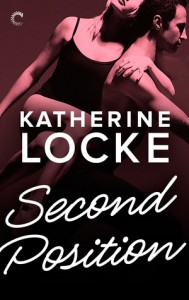
Four years ago, a car accident ended Zedekiah Harrow’s ballet career and sent Philadelphia Ballet principal dancer Alyona Miller spinning toward the breakdown that suspended her own. What they lost on the side of the road that day can never be replaced, and grief is always harshest under a spotlight...
Now twenty-three, Zed teaches music and theatre at a private school in Washington, D.C. and regularly attends AA meetings to keep the pain at bay. Aly has returned to D.C. to live with her mother while trying to recover from the mental and physical breakdown that forced her to take a leave of absence from the ballet world, and her adoring fans.
When Zed and Aly run into each other in a coffee shop, it’s as if no time has passed at all. But without the buffer and escape of dance—and with so much lust, anger and heartbreak hanging between them—their renewed connection will either allow them to build the together they never had... or destroy the fragile recoveries they've only started to make.
I finished this ages ago but could never put my feelings for it into proper words.
Now I am arguing with myself about whether I should rate it 4 or 5 stars because I was not a fan of Ally's therapy sessions. Not because of the content but because of the format. They were dialogue-only and that just doesn't work for me. They were still very powerful but I still felt I was missing something by just learning about what was said and not how it was said. But while the therapy sessions were important, ultimately, there weren't so many of them that it really bothered me.
And the rest was just brilliant. The prose almost made me swoon and I think I must have marked half of the sentences in each chapter because 'LOOK AT THEM! AREN'T THEY AMAZING?'
I loved Aly and Zed and their chemistry was great but at the same time it was fully understandable why they would distance themselves from one another. Their problems were believable and the eventual problem-resolvent was appropriately done and nothing huge just vanished into thin air. (It also means that it is very clearly a Happy for Now ending, so be warned if that's not your thing...if you don't mind: read this book)
Review: Jane Steele
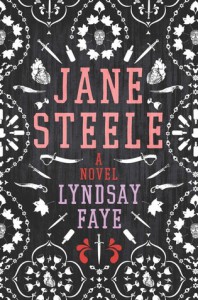
Reader, I murdered him. Like the heroine of the novel she adores, Jane Steele suffers cruelly at the hands of her aunt and schoolmaster. And like Jane Eyre, they call her wicked - but in her case, she fears the accusation is true. When she flees, she leaves behind the corpses of her tormentors. A fugitive navigating London's underbelly, Jane rights wrongs on behalf of the have-nots whilst avoiding the noose. Until an advertisement catches her eye. Her aunt has died and the new master at Highgate House, Mr Thornfield, seeks a governess. Anxious to know if she is Highgate's true heir, Jane takes the position and is soon caught up in the household's strange spell. When she falls in love with the mysterious Charles Thornfield, she faces a terrible dilemma: can she possess him - body, soul and secrets - and what if he discovers her murderous past?
This book gets advertised as 'What if Jane Eyre was a serial killer?' and while there are parallels to Jane Eyre and will appeal to lovers of the book and of a somewhat morbid humour, 'serial killer' isn't the right word to describe Jane. And this is exactly where I had some issues with the book: from today's viewpoint, only one or two of Jane's killings can really be classified as murder (and even those only just so), the others would be cases of manslaughter, accidents and also cases of self-defense (or defense of others).
Now, of course, this book isn't set in the present and back then most judges wouldn't have cared for the exact circumstances but it never crosses Jane's mind that she would be dead if she hadn't acted in the way she did. She just always refers to herself as a murderer and a horrible person. Again, you might blame the morals of those days on it but I would have wished for at least a few sparks of 'Well I'd be dead if I hadn't killed him' even if those thoughts had ended in 'But it doesn't matter. I took someone's life and the church/society says this is wrong and therefore I am a bad person.'
Eventually, somebody else tells her this and she then accepts it very quickly, which would have been more believable if she'd had thought about this herself before.
Now I really wish I could talk about why I love this book at least three times as much as I have talked about the problem I had with one aspect of it because I did love it. It was funny, the chemistry between Jane and Mr Thronfield is glorious. The supporting cast is amazing (basically, I want novels about all of them because they are so interesting and I'd love to learn more about them). But somehow I always find it much harder to talk about what I liked than about what I disliked, so don't let my complaints stop you from reading (and hopefully enjoying) this book yourself. I do not feel that I'm nitpicking when I'm talking about this issue since it's not a small thing, but it's also just one thing, while I found everything else done brilliantly.
So: read the book! Do it!
Review: Murder in Pastel
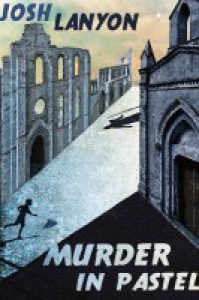
Ten years ago Cosmo Bari vanished, taking with him his legendary masterpiece, Virgin in Pastel. Since that day no one in the seaside art colony of Steeple Hill has heard from the eccentric painter.
Surrounded by an extended family of Cosmo’s colorful compatriots, mystery writer Kyle Bari believes he has come to terms with being abandoned by his famous father. Then his ex-lover Adam MacKinnon arrives with his new partner, the beautiful but poisonous, Brett.
Brett has an unerring instinct for other people’s weak spots and soon the quiet colony is seething with hostility and suspicion as Brett begin to hint he knows what happened to the missing artist.
This was...nice. It has the humour one is used to from Lanyon's other works. It also has a good mystery. At least once it starts properly, which takes a while. It takes till roughly the 40% mark till the first body appears. Now this is a personal preference of mine but I don't want to wait that long (especially in a cozy). Especially if a person has a sign with 'future victim' in neon letters over their head. If you've only read a few crime-novels you know who is going to kick the bucket and you are going to be waiting for it desperately because he is an utter arsehole.
Now that is a common trope in cozies and the reason why I prefer it when these characters get killed off early. It's just unbearable to read about them for long. Here there's the additional issue that I just can't comprehend why the other characters keep spending time with him. He is supposedly very good looking but not everybody can be so braindead from drooling over him that they always forgive him his dickish behaviour.
Still, the mystery was really good. I'd even say one of Lanyon's best ones and it would have made me forgive the other bits if I'd enjoyed the relationship between Kyle and Adam. Sadly it was mostly lacking chemistry. Like in Jefferson Blythe I had the impressions these characters have more feelings for their memories of the other person than the actual person standing in front of them and that just did not work.
Review: The Golden Cage
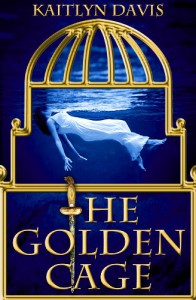
This is the story of Princess Speeciaal Snoowflaake in the country of Eveerything Is Hoorrible Aand We Like Voowels A Lot. Which isn't really an improvement over Every'thing is Horryble And We L'yke Apostrophes and Ys a lot since the naming conventions are not the problem I have with so many fantasy novels.
So Ourthuri is a Horrible Place. It is so horrible that the Queens get killed if their first child isn't a boy.
Would you like me to go into why this is an extremely stupid thing to do and an incredibly cheap plot device to show that this place is horrible?
No? I don't care. I'm going to do it anyway.
First: noblewomen worthy of a king don't grow on trees. Noblewomen, in general, don't grow on trees but the fact that usually not every noble family is considered high-ranking enough to provide a future Queen/the mother of the future ruler (just as Franz Ferdinand. Not the band. The Arch Duke. Even if he hadn't met a very unfortunate end, his children wouldn't have succeeded him on the throne because their mother wasn't noble enough...she wasn't even noble enough to get a space in the family-crypt which is why Franz Ferdinand and her rest somewhere else...and that was a short excursion to the house Habsburg). Killing them off, just because they didn't manage to produce an heir immediately is cliche-villain-evil and stupid.
Second: even if we assume that every noble is equal and everybody can marry the king: shouldn't a lot of noble families go 'You know what? We have this nice marriage proposal from a different noble family which is a lot less risky. We really prefer them.'
I mean there is no mention of any superstition connected to what influences the gender of children. (Along the lines of 'if she is pure enough and never has improper thoughts the child will be a boy'). They should know that if they marry their daughter to the king there is a 50% chance of her dying. So the have the choice between 'marry her to a random noble, forge some connections, perhaps gain a bit wider influence' or 'marry her to the king, possibility of gaining a lot of influence but just as likely to go back to square 0 (or even further since presumably having a daughter who 'failed' would cause a loss of prestige)'.
Yeah. There's always going to be people who try but the king in this story needed 13 wives to get a son.
Thirteen.
Henry VIII is laughing about him.
And how big is that bloody country that they have 13 noble families with daughters that are the right age to marry/not yet promised to somebody else/noble enough for a king/willing to marry their daughter to him (especially after he went through...the first 6 wives or so).
Having voiced my minor misgivings about some details of the world-building let me come to the plot.
Now this is a 50-page prequel-novella which means it doesn't have terribly much plot (I also need to point out that I seem to have a problem with prequel novellas in general. They might be set chronologically before the main books but they tend to be written more for the people who have already read the main books...so bear that in mind).
The story revolves around Princess Leena, one of the middle of the king's 12 daughters. She can breathe underwater, is unhappily in love with a palace guard (to clarify: not unhappily because he doesn't love her back, unhappily because the love to a mere palace guard is forbidden) named Mikzahooq (bless you), and is special because she is the only one who can see how horrible everything is.
Out of all these things I would have been really fascinated by the 'magically being able to breathe underwater'-bit but that's the one we learn least about. In fact, we only learn that she can do that and she wonders if she got it from her mother but doesn't even go into details about whether magic is common in this world or not.
What we do learn over and over again is that Leena's and bless-you's love is pure and sad and that Leena is special because everybody else is stupid.
[After a description of how she and her half-sisters are all sitting on thrones, dressed in fine clothes]
Like statuesque decorations in flowing dresses and jingling jewelery, their faces were hidden behind veils. A backdrop. Pieces of art to be admired. Leena Sighed. Of the twelve princesses, she seemed the only one uncomfortable with the whole display.
Of course. Leena quickly invents feminism. Nobody else had misgivings about that before. It can't possibly have to do the fact that nobody else has voiced those misgivings to her because the king is a tyrannical psychopath and trusting the wrong person could be fatal. Move on. Oh by the way: the veils are not made of fabric but of tiny golden chains. Oh symbolism. So subtle. Much wow.

A cage invisible to everybody it seemed except her. But it was there.
Or don't move on and keep going on about this.
A princess. But it was not how she saw herself. This girl was weak, demure, meant for nothing other than a life of birthing sons. Leena wanted so much more for herself.
Yes and you are the first one to think like that, my dear. When Leena is not moping about not being like the other princesses she has weird ideas about property:
Her clothes belonged to the maids that dressed her. It was their job to rifle through her drawers. And the topside of the bed belonged to the servants who snuck in every morning to carefully pull her sheets back into place and fluff the pillows. Even in her room, nothing truly belonged just to her.
Yeah. Sure.

What she actually bemoans here is that she doesn't have any private place to hide things. Which is a valid concern but so different from 'Strictly speaking, my pretty dresses, belong to my maids', that I do not know where to start with all the wrongness.
So...yeah. Plot. Leena and bless-you-guard want to escape because true love. Will they succeed? You have to read this novella to find out!
I have the whole series as ARC-bundle so this is going to be fun. But then the author's prose is rather nice and perhaps this just suffers from crap-prequel-syndrome.
I hope.
ARC provided by NetGalley.
Reading progress update: I've read 100%.

I realized a thing: I am sick of fantasy novels where magic exists and you have stuff like dragons/talking dogs/people breathing under water and who-knows-what-else but the whole world is still terribly sexist because 'hey pseudo-medieval world! It has to be sexist because historical accuracy!'
Here the Queen gets killed when her first child is a daughter. Seriously. That is politically such a stupid move that I am going to rant about it in-depth in my actual review but now just so much:
I'm finished with these type of books. I will continue with series with that set-up that I already started (that's A Song of Ice and Fire and The Iron Ship basically, as well as this series because I got the whole bundle as ARC) but if I can already tell from the blurb that Women Have It Horrible Here I'm going to give the book a pass because I am so tired of it.
(And yes, at least, both ASOIAF and TIS have great female characters who do more than moan and go 'I'm not like the other women' and that used to be enough for me but by now I'm getting tired of that as well).
 2
2
Review: The Baker Street Phantom
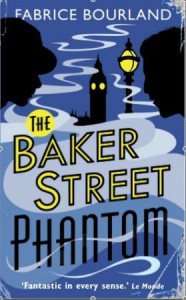
In the spring of 1932, with Londoners terrorised by a series of brutal murders, the private detective agency of Messrs. Singleton and Trelawney quietly opens its doors in Bloomsbury.
The first person to call on their services is a worried Lady Arthur Conan Doyle. She tells of mysterious events at 221 Baker Street – and a premonition that the London murders signal terrible danger for mankind.
Their investigation will take our intrepid heroes into a world of séances and spirits. Aided by the most famous detective of all time, they must draw on their knowledge of the imaginary to find the perpetrators of some very real and bloody crimes before they strike again…
It almost has to be admired how the author takes an awesome idea and tells it in almost the most boring way imaginable. Because of magic characters from famous Victorian novels appear on the streets of London. There is Sherlock Holmes - which is very cool - and there are Dorian Gray, Mr. Hyde, Dracula, and Jack the Ripper (it makes sense in context even though he is not a character from a novel) -which is less cool because they just continue what they did in the novels: kill people.
How do you mess such a great idea up? Easily: you take out any conflict and therefore, any excitement. The majority of the murders have already been committed by the time the novel starts and Singleton, our hero, just reads about them in the newspaper. (Conveniently all the murders are summed up in one article, despite there being huge differences in the MO). Since the paper also mentions where the murders have been committed he immediately makes the connection between that an 'all these places are mentioned in Dracula, Dorian Gray etc.'
Of course, that does not mean that he immediately goes 'clearly novel characters have been going round murdering people' but it doesn't take him long to get there. Shortly afterwards he attends a séance, despite not believing in the spiritual things and that one séance is enough to change his opinion on everything. Mediums are not all fake. A connection to the afterworld is possible. And not much later: the killer was probably Dracula.
And everything in the book is like this. There never is time for you to worry if the characters will get out of a dangerous situation/get somewhere in time because those are all resolved as quickly as the characters change their minds on long-held beliefs.
Talking about characters: they also couldn't save it. They remained so colourless that I could barely remember their names while reading the book.
ARC received from NetGalley.
Review: Cable Left, Cable Right

The problem with this book is that it roughly spends the same space for all the cables it describes, no matter how easy/difficult they are.
So you start off with really basic left or right-leaning cables and get about a page about it that contains the chart and some short explanation. There are even some cables that are almost the same except for the number of stitches, yet each of them gets a new page/chart/explanation.
Then the more complex ones start and they also only have the chart and a basic explanation. Suddenly you have huge charts and only a few sentences about them.
There are some cool cables in this book and I definitely will use some of them but the book had given me the impression that it would contain information about designing my own cables or, at least, adapting existing stitch-patterns and there wasn't much of that in the book.
94 cable patterns sound like a lot but, as said, that the first chapter contains a lot of very similar cables. And, considering it also doesn't go that much into depth you're probably better off with a cable-stitch dictionary.
 4
4
Review: Career of Evil

When a mysterious package is delivered to Robin Ellacott, she is horrified to discover that it contains a woman’s severed leg.
Her boss, private detective Cormoran Strike, is less surprised but no less alarmed. There are four people from his past who he thinks could be responsible – and Strike knows that any one of them is capable of sustained and unspeakable brutality.
With the police focusing on the one suspect Strike is increasingly sure is not the perpetrator, he and Robin take matters into their own hands, and delve into the dark and twisted worlds of the other three men. But as more horrendous acts occur, time is running out for the two of them…
Career of Evil is the third in the highly acclaimed series featuring private detective Cormoran Strike and his assistant Robin Ellacott. A fiendishly clever mystery with unexpected twists around every corner, it is also a gripping story of a man and a woman at a crossroads in their personal and professional lives.
Cormoran Strike knows four people who might send him a leg. Though he quickly decides that it's really only three because one of them has been known to murder people and cut them to pieces but he wouldn't send these pieces to Strike.
That probably tells you a lot about Strike. Like, that he needs different friends.
I enjoyed the mystery a lot. Usually, I'm not a fan of crime-novels where the killer gets POV-chapters but here it worked really well because he was so utterly despicable. Often I feel that deep down the authors want you to admire the killer (at least a bit) for being so clever but here that's clearly not the case. Every single thought he has is just horrible (e.g. he constantly refers to his girlfriend as 'It') and I wanted to cheer every time something went not as planned.
Those chapters also did a perfect job of confusing the reader further and lead him on the wrong trail. In fact, there were so many surprising twists and turns everywhere in the book. Just like I love my crime novels.
The police were conveniently incompetent in just the right moments for Strike (and Robin) to do all the important work but I guess that is a necessary evil in a book about a private investigator if you want him to have some interesting cases.
The continued development of Strike's and Robin's relationship was beautiful but the Robin-Mathew drama got a bit too much for my taste. It took up a lot of space and, unlike the first two books, I failed to see anything likable in him. In the second book, he was already a jerk more often than not but when he wasn't one I could understand what Robin saw in him. Now I just wanted her to strangle him every time he did/said anything. The more he appeared, the more I hoped that he'd be gone for good in the next book.
Well and then there was the ending. I am perfectly fine with cliffhanger endings. I am less fine with endings that make you wonder if the last chapter is missing from your copy and that was definitely the latter.
Review: True Pretenses
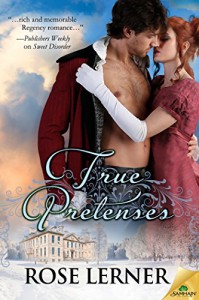
Through sheer force of will, Ash Cohen raised himself and his younger brother from the London slums to become the best of confidence men. He’s heartbroken to learn Rafe wants out of the life, but determined to grant his brother his wish.
It seems simple: find a lonely, wealthy woman. If he can get her to fall in love with Rafe, his brother will be set. There’s just one problem—Ash can’t take his eyes off her.
Heiress Lydia Reeve is immediately drawn to the kind, unassuming stranger who asks to tour her family’s portrait gallery. And if she married, she could use the money from her dowry for her philanthropic schemes. The attraction seems mutual and oh so serendipitous—until she realizes Ash is determined to matchmake for his younger brother.
When Lydia’s passionate kiss puts Rafe’s future at risk, Ash is forced to reveal a terrible family secret. Rafe disappears, and Lydia asks Ash to marry her instead. Leaving Ash to wonder—did he choose the perfect woman for his brother, or for himself?
Warning: Contains secrets and pies.
I am not a fan of 'True Love makes bad guy see the error of his ways and he redeems himself' storylines. Thankfully, this isn't really one of those. It isn't a real redemption-arc, more a self-realization arc, that works both ways. Ash and Lydia both realize several things about themselves that they already knew but were afraid to admit. Both learn that it's OK to want things for themselves. Especially Lydia learns that you shouldn't constantly second-guess what others expect of you. Both learn that they have been the overprotective older sibling a bit too long and that their little brothers can think and decide for themselvesIt is all very beautiful and everybody is delightfully reasonable most of the time.
It is all very beautiful and everybody is delightfully reasonable most of the time. Unfortunately, that also means that book is a bit dull at times. And I'm really torn here. For example, I really like that Lydia learns about Ash's past quite early on and decides that it doesn't matter. That is great, not only that she thinks like this but also that this reveal didn't come only at the climax. If such a major thing had been kept from her for so long, I couldn't have seen how she would have ever been able to trust him again. But by getting that over so quickly, the major obstacle to their relationship was out of the way after roughly a third of the book.
Now I'm not saying that people have to be stupid for (romance) novels to work. In fact, the first Lively St. Lemeston book proves that. Nick and Phoebe are also quite reasonable but then their happiness gets threatened from the outside. For most of the book, Ash and Lydia's happiness is only threatened from the inside, they talk about it and resolve things. Which is a great sign of a healthy relationship but it also means there are long parts that mostly involve Lydia thinking about Ash while her ladyparts ache and...that is not terribly exiting. Towards the end, another obstacle appears but that gets also resolved too quickly to be that thrilling.
Having said all that: I still read the book in two days. I loved the characters and apart from the relationship between Ash and Lydia I also enjoyed the relationship both had with their brothers. (Siblings who genuinely care but also screw up occasionally are my favourite thing). The minor characters are all beautifully written (and some already appeared in Sweet Disorder so it was fun seeing them again). Still, it dragged on several occasions and I doubt I'll re-read it anytime, soon.





 1
1